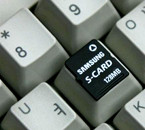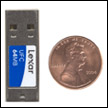SUNOL, Calif. --(Business Wire)-- Nov. 30, 2004 -- Membership Continues Rapid Expansion, Including Intel and Sony Ericsson Mobile Communications
The MultiMediaCard Association (MMCA) recently held a very successful exhibition at the Oct. 26-30 PT/EXPO COMM CHINA 2004 and a MMCA Technology Conference in Beijing, to introduce the MMCplus(TM) and MMCmobile(TM) Cards to the Chinese market.
The Technology Conference held on Nov. 1 was well attended by representatives from China's telecommunication industries and the media. Event highlights include keynotes by Mr. Zhao Bo, Deputy Director General of Division of Computer & System Engineering, Department of Electronics and IT Products of the Ministry of Information Industries (MII), and Dr. Chen Qinfang, Vice President of China Putan Institute of Technology and Team Leader of China Mobile Storage Device Standard Work Group. Representatives of China Mobile and China Unicom also attended, and the event received widespread coverage in China.
According to Danny Lin, Vice President of ATP and MMCA Marketing Committee Vice-Chairman, "We were delighted to have the opportunity to introduce our new MMCmobile and MMCplus Cards for mobile phones and digital imaging markets in China, and to see such tremendous media response in a wide range of coverage from newspapers, magazines, televisions and online. In addition, the response from the network operators and mobile phone OEMs to MMCmobile and MMCplus Cards, due to their open standard and lowest cost solution for data storage in mobile devices, was truly overwhelming."
Immediately following the Technology Conference, the MMCA held its first Fall General Meeting and Board Election in Beijing, during which a full slate of new marketing, technical and compliance issues were considered.
Proposals included encompassing the ATA protocol for HDD on the MMC interface for ultra-small hard disk drive (HDD) applications in mobile devices. A sub-committee, led by members from Nokia, Marvell and Samsung, was formed to study the matter.
There was also further discussion about supporting secure contents and the mobile network operators' and content owners' technical and business requirements. The newly elected MMCA Board for 2005 is well-represented by leading mobile handset, computer and camera makers, flash memory card and SIM card manufacturers and semiconductor companies. The 2005 board members are: ATP Electronics, Gemplus, Hewlett-Packard, Infineon Flash, Lexar Media, Micron Technology, Nokia Mobile Phones, Power Digital Card, Renesas Technology, Samsung Electronics and Silicon Motion.
The newly elected MMCA Board for 2005 is well-represented by leading mobile handset, computer and camera makers, flash memory card and SIM card manufacturers and semiconductor companies. The 2005 board members are: ATP Electronics, Gemplus, Hewlett-Packard, Infineon Flash, Lexar Media, Micron Technology, Nokia Mobile Phones, Power Digital Card, Renesas Technology, Samsung Electronics and Silicon Motion.
Re-elected to continue in their present positions are MMCA Chairman Yves Leonard (Samsung) and President Juergen Hammerschmitt (Infineon) who have impressively guided the association in the recent acceleration in market recognition and adoption of the MMC standards.
Membership growth:
Membership in the Association continues to grow significantly, with over 190 companies now, which is nearly double that of a year ago.
New members include handset manufacturers (Sony Ericsson Mobile Communications and Konka), Smart Card suppliers (Oberthur Card Systems and Giesecke & Devrient) and HDD and HDD-controller manufacturers (Seagate, Toshiba, Hitachi Global Storage Technologies, Matsushita, Marvell, Agere, and others), as well as Intel and Denali Software. In addition to Oberthur, BYD Company Ltd. and Kingston Technologies joined as Executive Members.
"We're entering 2005 with a strong board, increased membership, a growing global market for the MMC standard and positive response to our new brand and logos," said Yves Leonard, MMCA Board Chairman. "It was an exciting year for the MMCA, and the momentum will continue into 2005."
About MultiMediaCards
MultiMediaCards are the small, removable solid-state memory cards designed especially for mobile phones and digital imaging, among other applications. These convenient, reliable, rugged and lightweight standardized data carriers store up to 1 Gbyte, or approximately 640,000 book pages. MultiMediaCards use ROM or flash technology for read-only applications, and flash technology for read/write applications. The cards are fast for excellent system performance; energy efficient for prolonged battery life in portable products; and cost-efficient for use in systems sold at consumer price points. They also have an easy-to-install serial interface.
About The MMCA (MultiMediaCard Association -
www.mmca.org)
The MMCA is the open standard memory card organization, promoting worldwide adoption of a postage-stamp size, removable storage card designed especially for mobile phones and digital imaging. Founded in 1998 with 14 companies, the MMCA has grown rapidly and now has 190+ members worldwide, representing all branches of mobile electronic applications, including semiconductor suppliers, software vendors and manufacturers of low power devices for storing and retrieving digital information.
The MMCA develops and regulates open industry standards that define all types of MultiMediaCards, ensuring full interoperability. The organization charges no royalties for using the membership-driven standard, although a nominal license fee is included in the membership dues. Specifications are available to members from the organization's website, and can be purchased for $1,000 by non-members. MultiMediaCards are becoming the industry standard for compact removable storage media across multiple host platforms and markets, including cell phones, digital cameras, PDAs, MP-3 digital music players, portable video games and laptop computers. The MMCA mailing address is P.O. Box 303, Sunol, CA 94586; Ph: 925-417-0127; Fax: 925-417-0128. More information is at
www.mmca.org.
MMCplus(TM) and MMCmobile(TM) are trademarks of MultiMediaCard Association (MMCA).
Company/product names mentioned may be trademarks or registered trademarks of their respective holders and are used for identification purpose only.



